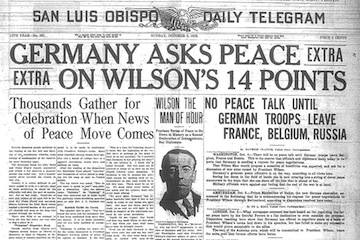The Fourteen Points, the League of Nations, and Wilson's Failed Idealism
Fighting in World War I famously ended at 11:00 on November 11, 1918. The United States was instrumental to the Allied victory, and President Woodrow Wilson had a grand, idealistic vision for the future of world politics. Within a year he was incapacitated, and his dream had been torn apart by opposition in both the United States and Europe. His failure should serve as a cautionary tale to any potential idealist or architect of a sweeping new order.
The immediate cause for U.S. entry into World War I was the unrestricted submarine warfare of Germany, which sank many merchant vessels and killed scores of noncombatant Americans. A different President might have framed the war aims as the simple defeat of Germany, in retaliation for these acts. Appetite for foreign alliances and intervention was not strong in much of the United States. However, Woodrow Wilson took the opposite approach and framed the U.S. war in the most sweeping, grandiose terms he could find. The U.S. was fighting, in his words, "to make the world safe for democracy", and it was fighting "a war to end all wars". Wilson planned accordingly, envisioning a sweeping change to global politics which would usher in a new era of internationalism and U.S. involvement in world affairs.
There were good arguments to be made that the United States no longer lived in the world of George Washington, where the nation could hope to stay out of Europe and avoid "entangling alliances". However, most the United States still subscribed to the traditional theory, and anyone could have predicted that opposition to Wilson's vision would be strong and unrelenting. Most people supported a war against Germany after the outrages perpetrated against Americans abroad, but fewer believed that this warranted a revolution in the global political order. Republicans, Irish-Americans, and German-Americans in particular would come to oppose the proposals that Wilson supported, and would drive the opposition to his treaties in the Senate.
And what was Wilson's vision? The first piece he articulated was his Fourteen Points, revealed in a speech on January 8, 1918. Many of these points dealt with specific territorial questions of World War I, and how they might be resolved. But others dealt with a broader plan for peace in general. They imagined a world with smaller armies, better international governance, and open diplomacy. They did not call for harsh reparations of punishment against the Central Powers (Germany and allies) after the war, in a break from other Allies such as France. That nation suffered massive devastation to its population and infrastructure throughout the war, and took a much harder line on what should be done with Germany afterwards.
The final point of the Fourteen Points called for a "general association of nations" that would prevent future conflict. This was a key inspiration for the League of Nations, an organization designed to mitigate international disputes and prevent future wars. Wilson was central to the very creation of the organization, and then turned to the U.S. Senate to ratify it and approve the membership of the United States. This he did in a speech to the Senate on July 10, 1919. Until this point, Wilson had been the main U.S. representative on Europe, and the League of Nations represented his own notions almost completely. There was some opposition in general, but there was very specific opposition to a particular article. Article Ten stated that members should come to the aid of any member subject to external aggression. This would have meant that, in practice, the U.S. could have been called to defend any of about 50 member nations, or else it would fail to live up to the agreement. The very Constitutionality of joining the League of Nations was called into question on this point.
Wilson refused to compromise on this article, or on any other issue related to the League. In fact, he had compromised with the European powers on many other points in the Treaty of Versailles to ensure the League of Nations would be created. Once back in the U.S., he went on a national tour to rally support, and so overstrained himself that he suffered a stroke. The Senate failed to ratify the League of Nations and the United States never became a member. In 1920, Warren Harding rode a backlash against Wilson's final years in office to a landslide victory, putting the United States on a firmly independent course. Through his unwavering, uncompromising nature, Wilson set his own cause back immeasurably and undermined the very ideals and organization that he held in such esteem.
